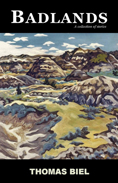
 |
Some writers have mastered the art of spinning fantastic tales, trotting out lies of mystery, romance, and high adventure that while barely believable still manage to entertain us. Others choose to cut closer to the bone of truth, making us turn to the author's blurb at the back of the book to see whether or not what we are reading is fiction or fact. Biel falls into this latter camp with his debut collection of linked stories, episodes from the life of his youthful protagonist, Matthew Davis, that seem too painfully real to be imaginary.
Set in the fictional community of Riverside in eastern Montana, Badlands blends the traditional elements of a coming-of-age story with an unvarnished portrayal of the cultural changes that were beginning to permeate small-town America during the Vietnam War era. While these aspects alone might make the book worth reading, it is Biel's development of other characters in his narrative that set this collection apart. For example, in the process of chronicling his narrator's personal journey to manhood, he is also exploring the lives of key individuals whose own successes and tragedies as they interact with his protagonist help shape the person Matthew will eventually become. In fact, Matthew's development at times seems almost incidental to the author's rich treatment of the other people he brings to life. One such individual is Matthew's best friend, Idaho Wells. In the earlier tales their adventures resemble those of Tom Sawyer and Huck Finn. Yet as the years pass it becomes clear that Matthew doesn't have the innate leadership skills or cunning of Tom, while Idaho is a darker and much more tragic figure than Huck ever was. Idaho is a flawed hero, a fierce protector, and a doomed lover. Biel imbues him with incredible potential, but also paints his life with a realism that precludes a happy ending for him. Matthew's father is another complex character whose struggles to reconcile his growing atheism with his career as the pastor of one of the local churches impact the futures of those around him, especially his son. The pathos brought about by other characters such as Monica Rose and, especially, Terry McAuliffe also serve to enrich the narrative and draw the reader even further into Matthew's world.
Although the rich characterizations are arguably the finest elements in the book, a strong contender is the dead-on realism of the atmosphere. For instance, the almost warlike rivalry, hatred, and prejudice between the residents of Riverside and Pyramid, a neighboring town, should be easily recognizable to anyone who grew up in mid-America during the '60s and '70s. Many readers will also remember the intense polarization between certain segments of teenagers which erupted into periodic battles between groups labeled "Rednecks" and "Freaks." Nor does the author ignore some of the even darker dangers that have always faced some young people growing up such as pedophilia. In just twelve stories Biel manages to successfully revisit the drama, the rampant alcohol and drug use, the anti-war sentiments, and the rising social changes of the era.
Those who prefer their fiction to be softer or more far-fetched will need to search elsewhere. But for readers who enjoy stories that portray life as it was without sugar-coating the language or the truth, Biel's well-written look at growing up in a turbulent time period is a must read.
RECOMMENDED by the US Review